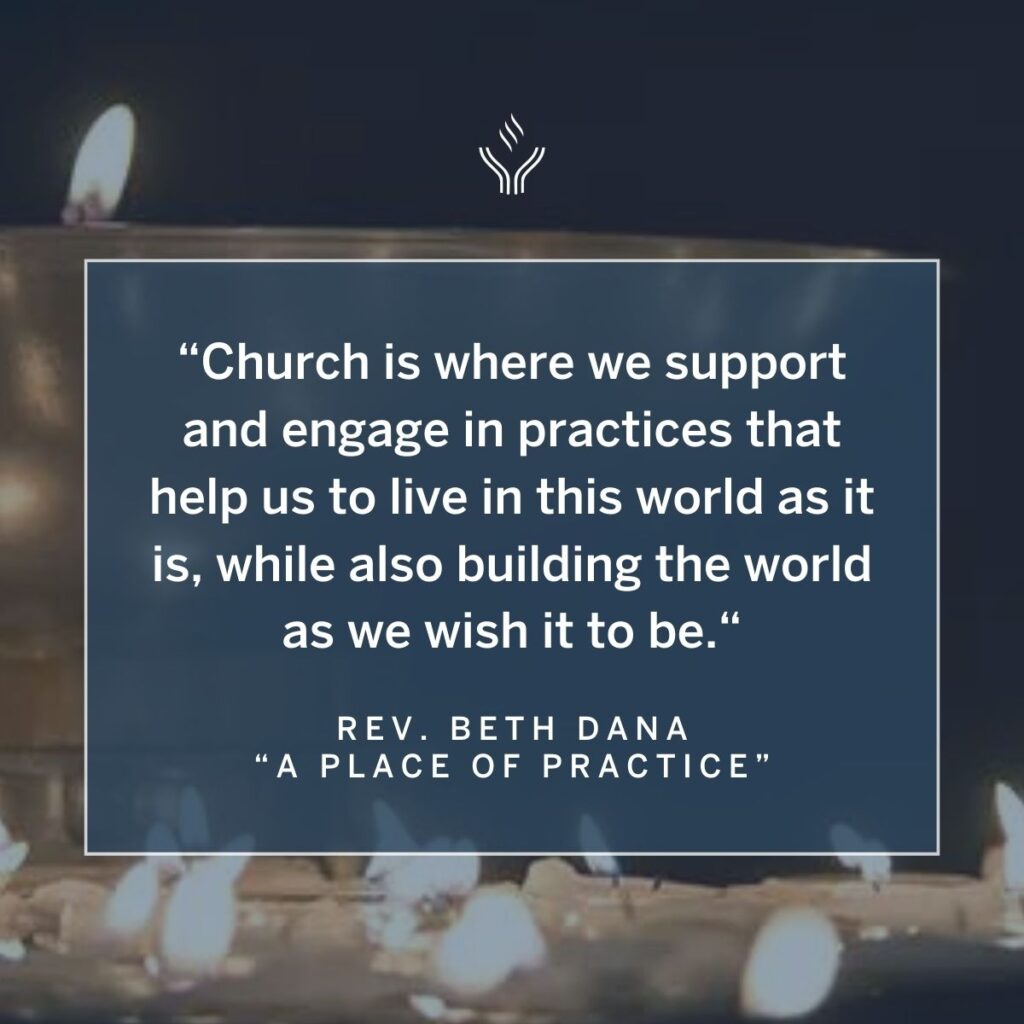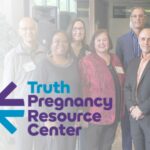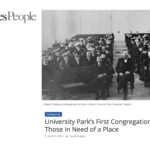A Place of Practice | Rev. Beth Dana | 04.07.24


Sermon Transcript
“Let us be a house of welcome, living stone upholding living stone, gladly showing all our neighbors that we are not our own.” That’s what I thought of when I heard that we were singing this hymn this Sunday, but church isn’t the building. Our online members know that well, and church isn’t the steeple, which is a good thing because we don’t have one of those. And church isn’t the ministers, that would be asking too much of three human beings. So whenever I am talking with church members and you start referring to the church, as in “the church should” or “I love that the church is”, I often ask for clarification. What do you mean by the church? Do you mean the ministers? Do you mean the institution as a whole? Do you mean the people? And do you include yourself in what you’re saying about the church?
In religious communities of all kinds, not only Unitarian Universalist, the church is understood as the people and the ministry that we do together. We are the church. We are the living stones upholding living stones, creating a house of welcome. Every Sunday we throw open our literal and virtual doors to gather once again. And you come in large numbers. Just last Sunday, about 700 people came through these physical doors for worship, and another few hundred joined us online. And I would guess given our theology that it’s not the threat of sin that compels you to come to church, nor is it the lure of salvation after this life.
And the natural world outside of church offers so much beauty in this season. The wild flowers are at their peak. I know my rose bushes are bursting with fragrant blooms and many are scurrying around preparing for tomorrow’s awe-inspiring total eclipse. So I lovingly ask you, what are you doing here?
Each of you has your reasons for coming to church, I know. Maybe you love the beautiful building, the space, the wonderful ministers, the donuts and the baked goods that we have every Sunday. It’s an opportunity to gather with friends, or maybe something that your family does all together. You come to church for inspiration, for a moment of pause when you’re weak, for a reprieve from loneliness. Or maybe you love the mission and the values that we promote and embody together.
Understanding the Purpose of Church
All of these are very good reasons to come to church, but none of these reasons fully answer today’s question in this three-part sermon series. Today’s question being, what is church for? The Rev. Rob Eller-Isaacs, a wise UU colleague who we lost just in the past year, told a story about a retreat that he facilitated years ago for the board of trustees of a Unitarian Universalist congregation. And he asked them, “In what ways does church involvement foster transformation in your lives?”
There was an awkward period of silence following his question, and then one of the trustees said, “I’ve never thought of our church as a place where people change their lives. It’s always been a liberal refuge for community connections, cultural enrichment, making friends and opportunities for learning.”
Now, another awkward silence ensued and Rev. Eller-Isaacs said that he was taken aback because his experience of the ministry that we do together implied a different understanding of the church and what it’s for. He said, “The church is not primarily about building community, though community is built. The church is not primarily about making friends, though friends are made. The church is not even primarily about alleviating suffering, though suffering may well be relieved.” He said, “We are meant to be communities of accountability in which both the world and we ourselves are changed for the better.”
He was saying, in other words, community and friends and alleviation of suffering are fruits of a deeper purpose for which we come together. We don’t come together so that things can stay the same. We come together to make a difference and to bring about transformation.
Lessons from Church History
In 1935, James Luther Adams, a young Unitarian minister and professor of theology at one of our Unitarian seminaries, had an experience that many seminarians and newly-minted ministers have when the rubber hits the road and they realize that their lofty hopes and theological musings do not always match reality. Adams went to Germany to study with the great liberal theologians of his time with high hopes for what he would encounter in the churches that had inherited Germany’s long tradition of liberal theology. Adams had converted to Unitarianism from Baptist fundamentalism, and he knew that the transcendentalist movement in Unitarianism in the early to mid-1800s, which lifted up the power of intuition, the experience of the divine in the every day, and the inherent goodness of people and nature had been influenced significantly by liberal German theologians like Friedrich Schleiermacher and Immanuel Kant.
What he discovered when he arrived in Germany was deeply unsettling to him. The tradition that he had put on a pedestal in some ways was largely ineffective in resisting the rise of Nazism. German liberalism was not prepared for the threat of Nazism, and was not equipped with the theological resources to resist it. He wrote later, reflecting on the impact of his experience, “In Nazi Germany, I soon came to the question, ‘What is it in my preaching and my political action that would stop this?’ It is a liberal attitude to say that we keep ourselves informed and read the best papers on these matters and perhaps join a voluntary association now and then, but to be involved with other people so that it costs, and so that one exposes the evils of society, requires something like conversion, something more than an attitude. It requires a sense that there is something wrong, and I must be different from the way that I have been.”
So Adams came away from this experience rethinking his ministry and the purpose of his theological work in significant ways. He realized that a liberal attitude that he witnessed, kept people in communities stagnant and insular. It was commitment and conversion, which is a process of transformation, that we’re required to face the evils of his day. And it is these same things that are required of us to face the evils of our day. The rise of new powerful expressions of Nazism and fascism, fear and hate.
Embracing Church as Practice
James Luther Adams devoted the remainder of his career as a minister and theologian to promoting a deeper understanding of what it means to be human religiously, and what it means to gather in religious community, and the importance and power of these communities to affect change. He famously wrote, “Church is a place where you get to practice what it means to be human.”
A statement that I return to often in my ministry, “Church is a place where you get to practice what it means to be human.” This way of understanding church does not assume or require perfection. In fact, it assumes imperfection and change and transformation and messiness and mistakes and healing and repair. This is what it is to be part of a covenantal church. It’s a laboratory in which we bring who we are and our experiences, and put all of it together to make meaning and to seek and bring about transformation. Church is where we support and engage in practices that help us to live in this world as it is, while also building the world as we wish it to be.
The authors of our two readings today, Unitarian Universalist minister, John Wolf, and poet, Mary Oliver, approached church very differently in their lives, but they both have a message that I believe is relevant to us today.
Rev. Wolf spent his life building strong church institutions, serving as minister of three churches, including All Souls Church in Tulsa for 35 years. He also helped found two new churches in Tulsa during his ministry with All Souls. He served Unitarian Universalism at large in a number of ways, and was a force for change on issues of civil rights and racial justice.
Mary Oliver, a Pulitzer Prize-winning poet, beloved by many Unitarian Universalists, stayed away from church for years after leaving the church of her upbringing. While later in life she became involved in an Episcopal church, she primarily found God by being present in nature and listening to its wisdom. You can hear this reflected in pretty much every one of her poems. Her poems, however, have been read in churches across denominations because they’re full of spiritual and theological questions and deeply human explorations. While her experiences in nature rarely involved other human beings, she found community in nature through creatures, like the wild geese of today’s poem.
She said, “The world offers itself to your imagination, calls to you like the wild geese, harsh and exciting, over and over announcing your place in the family of things. We are part of the family of things.” Mary Oliver heard this call from the wild geese flying overhead, but we also hear this call from the church, echoing the call of the world, reminding us that we are here at church to practice being in the family of things.
This is a place of practice, and it is a place that helps us to discern what is worthy of our lives and of our love. I love how Rev. Wolf puts it so plainly, that “We support church, not because it buys you some insurance policy toward your funeral service, but because it calls you to worship what is truly worthy of your sacrifice.” We’re not here in church because of the threat of sin or the lure of personal salvation after this life, but we are here because we seek to build beloved community in this life, on this earth, in this church, living stone by living stone, so that all may know love and justice and belonging.
The Power of Belonging
Church offers belonging, but belonging is not static. Every time a person comes to church and finds that they belong here, the church is transformed. Maybe not in huge obvious ways, but it is transformed in small meaningful ways. Certainly for that person, but also for the rest of us. And this is why we expect certain things of our members. People who are making the intentional choice to join, to commit in the way that James Luther Adams talked about. We expect you to have a spiritual practice, to get engaged in the church through small groups and classes, to deepen your spiritual life through worship and to join with others through service in the quest to build a more just and loving and compassionate world. You as an individual, and the church as a whole, are transformed in the process of finding belonging and making space for others to belong as well.
Recognizing Impact
Have you been changed by church? Any of you been changed by church? A lot of you. If you have any religious trauma, perhaps that’s what pops into your head first, the ways that you’ve been negatively impacted. But I invite you to broaden your reflection to the ways that you have been changed for the better by church. Whether you have been part of a church community, or this church community for years and have been deeply impacted, or if today is the first time that you have ever attended a worship service of any kind and it’s just beginning to open your eyes to what’s possible. Many would say that their sense of self, their sense of their place in the family of things, their sense of responsibility and their system of values have all been changed by church.
The impact of church on your life may be present in more ways than you realize at first. Deep reflection on this matter and the realization that came from it, is in large part what led me to embrace my call to ministry. So who knows where it will lead you. Recognizing the impact of church on our daily lives is a first step toward this church being known and recognized as a powerful force in our wider community.
For the 10 years that I have been serving as one of your ministers here, I’ve heard a strong desire to be known. It’s a very human desire to be seen and known. A desire that exists on the collective level as well. Being known in the community happens, in part, through each of you individually. It happens when you live your faith out loud and share the ways that this church has transformed you. It happens when we open our doors and welcome people in. And it happens when we go out our doors and engage in ministry and service together. We are known. I can’t even tell you how many times people have said to me, “Oh, you’re that church that,” and fill in the blank.
Just a couple of weeks ago I chimed in on a Facebook thread in a local moms group along with a few of you who are also in that group, responding to someone seeking a recommendation for where to go to church on Easter Sunday. Before I even got to the Facebook thread, a few of you had recommended this church, and others replied, “Oh, the Unitarian Church. If I were to go to a church, that’s where I would go.”
So they know, even if just in a vague sense, that we are a force for good in the world of community where they could belong. I know I’m doing my part to try to convince them that giving church community a try is a good thing, and to make that vague sense a real, known and felt experience. And even if that’s not the outcome, maybe I’ll make a new friend in the process.
Unitarian minister, A. Powell Davies wrote, “We meet each other as friends and neighbors anywhere and everywhere, but we seldom do so in the consciousness of our soul’s deepest yearnings. Life must have its sacred moments and its holy places. We need the unutterable communion of our spirits with the spirit of the highest. All that joins the soul with what it yearns for, all that can raise the frailty of our incomplete humanity toward the level of the spirit’s aspirations, that our earthly dust may meet and mingle with the majesty and the mystery of God.”
Church is the people. People joining our spiritual yearnings with those of others, meeting and mingling with the beauty and the mystery of God. An experience in which we can’t not be transformed. It’s people practicing being human and finding our place of belonging in the family of things. So let’s keep practicing this together, friends, and may it ever be so. Amen.







